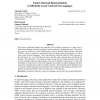123 search results - page 6 / 25 » Natural Language Grammar Induction Using a Constituent-Conte... |
105
click to vote
COLING
1996
15 years 29 days ago
1996
Porting a Natural Language Processing (NLP) system to a new domain remains one of the bottlenecks in syntactic parsing, because of the amount of effort required to fix gaps in the...
109
click to vote
JMLR
2010
14 years 6 months ago
2010
We present a polynomial update time algorithm for the inductive inference of a large class of context-free languages using the paradigm of positive data and a membership oracle. W...
ACL
2009
14 years 9 months ago
2009
We investigate the task of unsupervised constituency parsing from bilingual parallel corpora. Our goal is to use bilingual cues to learn improved parsing models for each language ...
100
click to vote
BIOCOMP
2006
15 years 1 months ago
2006
- In this study, a context-sensitive grammar is suggested to model various forms of RNA secondary structures, especially pseudoknots. Comparing with a conventional context-free gra...
118
click to vote
JMLR
2011
14 years 6 months ago
2011
A strong inductive bias is essential in unsupervised grammar induction. In this paper, we explore a particular sparsity bias in dependency grammars that encourages a small number ...

